It's one of the most often-asked questions that has been posed (by Iranians) since we arrived in Iran, "Why did you want to come to Iran?". It really is quite a hard question to answer, and I can't give a straight answer! Maybe it's from my desire to explore a hard to "reach" destination, or being frustrated at the media's narrow portrayal of such a culturally rich country. Whatever it was, it had captured my imagination, and coming here has been a dream for a long time. We were really thrown into the deep end upon entering Iran by leaving the border post after dark had fallen. Iran has some of the most chaotic driving in the world, and facing this for the first time in the dark was something I would have rather avoided. However without any choice, we entered the flow of fast moving and constant lane-changing traffic, heading towards our stop for the night, Orumiyeh. With a few close-calls, but scrapes avoided, we managed to make it to the city centre and find our hotel. After a quick rest-stop in our hotel room, we ventured out to see what we would encounter in our first taste of Iran.
We were greeted by a society that is clearly most alive in the evenings. People and commerce abounded. From the hustle and bustle alone, you wouldn't guess that this is a country trying to stay on it's feet under the weight of international sanctions. One immediately obvious aspect of their businesses that is so starkly (and I have to say pleasantly) different from the West, is the maintenance of local, specialised shops/traders. In these regional parts of Iran, superstores simply don't exist. Down the Imam street (main street), hundreds of shops of only a few square metres are sandwiched up together, each selling their own specialised wares. For example, one shop will sell just pots and pans, the next vacuum cleaners, the next washing machines, the next rope and chain, and so on. Examining the variety of proudly displayed products made for very enjoyable window shopping as we walked around the streets, lit brightly by the plethora of neon shop signs.
Having an introduction to Iran just on our own was quite nice, but we were looking forward to getting to know some of the people. Our first hosts in Iran were in the city of Tabriz. After a bit of trouble finding the address of our destination, we finally made it to the inside of an Iranian home. We entered into the beautiful house, to find a home full of warmly welcoming and incredibly hospitable Iranians, who were so pleased to have us stay. The evening was filled with chai (tea) and chatting, exchanging stories of each other's lives, more chai, local jokes, an exhibition of Azerbaijani music (people from this region are culturally Azerbaijani), and sharing of photos. And then there was the food... It was exquisite; Plates full of the most amazing Iranian cuisine were thoroughly enjoyed from the comforting Persian rug of the lounge floor - this is what we had come to Iran for! We spent another day with the hosts (and their beautiful friends) exploring a local mosque, the largest covered bazar (market) in the world, and having a local specialty for lunch. By the time we left we felt dear to them, and they showed their love for us with gifts of incredible generosity. We could have thought this family was a one-off, but it was to be repeated again at our next host's place. Again a beautiful home with warm and generous hosts, and an evening full of fun, chatting, learning, and incredibly amazing food...! (Much to my delight, Jean has been writing scores of notes on the food and cooking! She can add more details of the food in a later post).
The combination of our two loves, amazing food and incredible people, added to millenniums of history spanning multiple empires, bustling bazars full of exotic products, and jaw-dropping mosques and palaces, is what for us makes Iran an intoxicating place to visit. It feels cliche to say, but the feeling of being here on the ground is so different to the images portrayed by foreign media. Even the "Islamic-ness" is considerably less obvious than I had imagined. Apart from the hejab being compulsory for women in public (ensuring hair, arms and legs are covered), I felt more relaxed here than in parts of Eastern Turkey. Many Iranian people are liberal and non-religious, and push the Islamic restrictions to their limit (or throw them completely out the window inside their home). Family-culture is very important and strong in Iran. It is common to see families and couples out enjoying life together in public places, and this made a relieving change from Eastern Turkey, where Jean and I felt particularly foreign by being out in public together.
I think the key to being able to appreciate and enjoy Iran is separating the powers-that-be from the people. We are lucky in our countries (NZ, Australia, and the UK) to have a high degree of integrity in the democratic process, and the result is governments that largely (of course never completely) represent the views of the people. In Iran there is a much wider divide between the people and the power. I believe that there certainly is a case to answer for the Iranian powers in issues that are highlighted in our media, such as uranium enrichment and the suppression of free speech (in the media particularly). But the views and feelings of the Iranian powers (particularly the religious powers, which trump the elected government's views) are not shared by the majority of Iranian people. Iran, like most countries, contains a wide range of people with a wide range of views. Don't mistake me, there are of course many practising religious people here, but only a section of these strongly support the Islamic state with it's enforcement of Islamic regulations and it's hatred of the West. From my impressions of our time so far in Iran, there are far more people here with a completely different view; A warm and positive view towards Western people, a desire to connect and do business more with them, a desire for a completely free and non-religious government, a frustration at the lack of "resolution" in the nuclear issues. The majority of Iranian people, particularly among the younger generation, are well-educated and intelligent. One of the biggest mistakes you can make in Iran is to assume that Iranians are like some of their Middle-Eastern neighbours. While the problems of it's relationship with the West is causing some troublesome economic instability, with wars going on all around it, Iran is a remarkably stable oasis in a chaotic and dysfunctional desert.
Once you are able to separate the people from the power, you are able to enjoy the jewel which is Iran. It's only our first week here, and we've already tasted some of the best food we've ever eaten, and met some of the dearest, most hospitable and generous people we've ever encountered. There are certainly some elements of Iran I would never want in my own country, but some aspects of their culture are so precious I hope we can incorporate them at least partly in to our own.
 |
| Out shopping in the morning in Orumiyeh |
 |
| Some special sweets made only in Orumiyeh. They are made by slowly coating walnuts with layers of an icing sugar coating |
 |
| We thought the Turkish were good at loading trucks, but they are clearly trumped by the Iranians! |
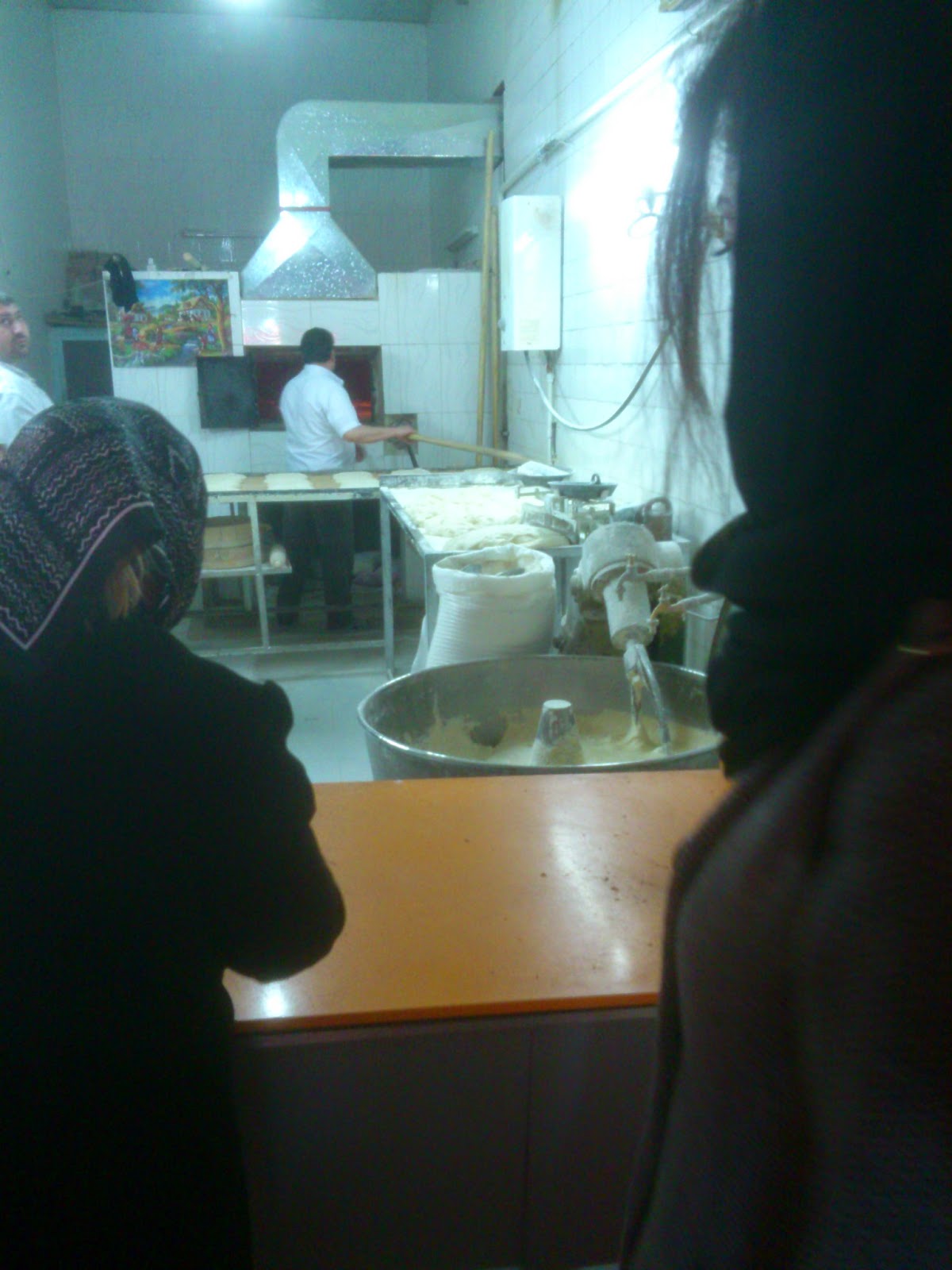 |
| Going to by bread in the evening from a traditional bakery. Each bakery makes just one type bread, which differs from bakery to bakery. This one made a delicious bread called Barbari |
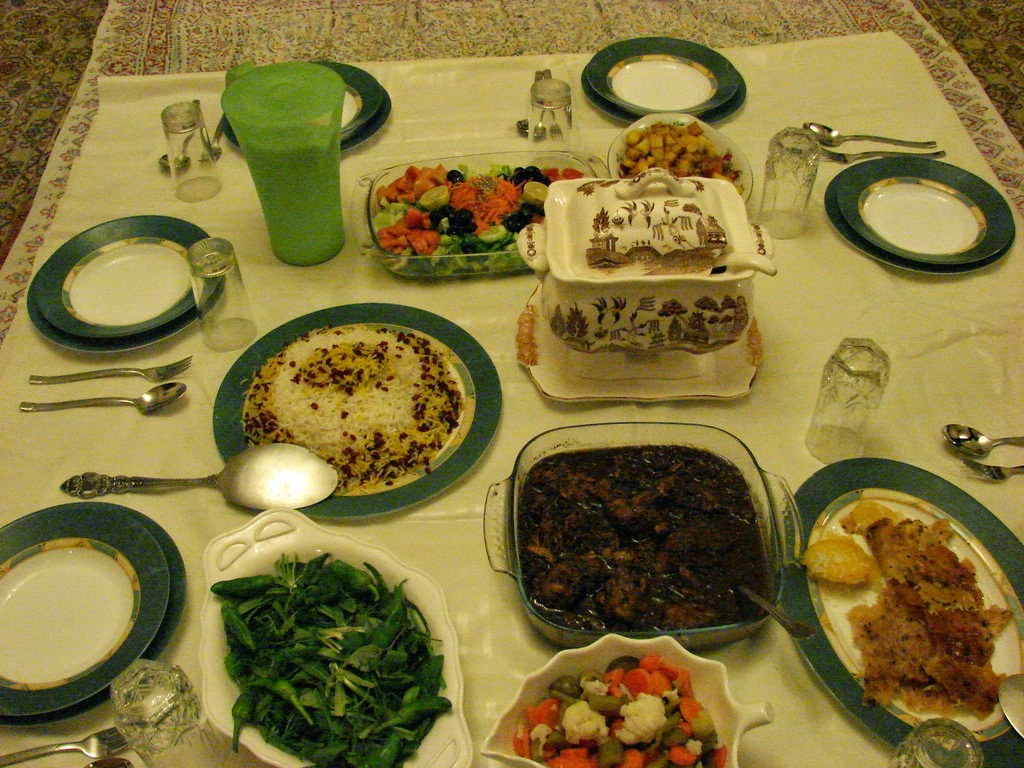 |
| The dinner spread put on by our first hosts in Tabriz |
 |
| Enjoying chai after dinner |
 |
| The Blue Mosque of Tabriz. It was badly damaged in an earthquake over a century ago. It was only repaired in the 1980s. |
 |
| Enjoying the colours of the Tabriz covered bazar. |
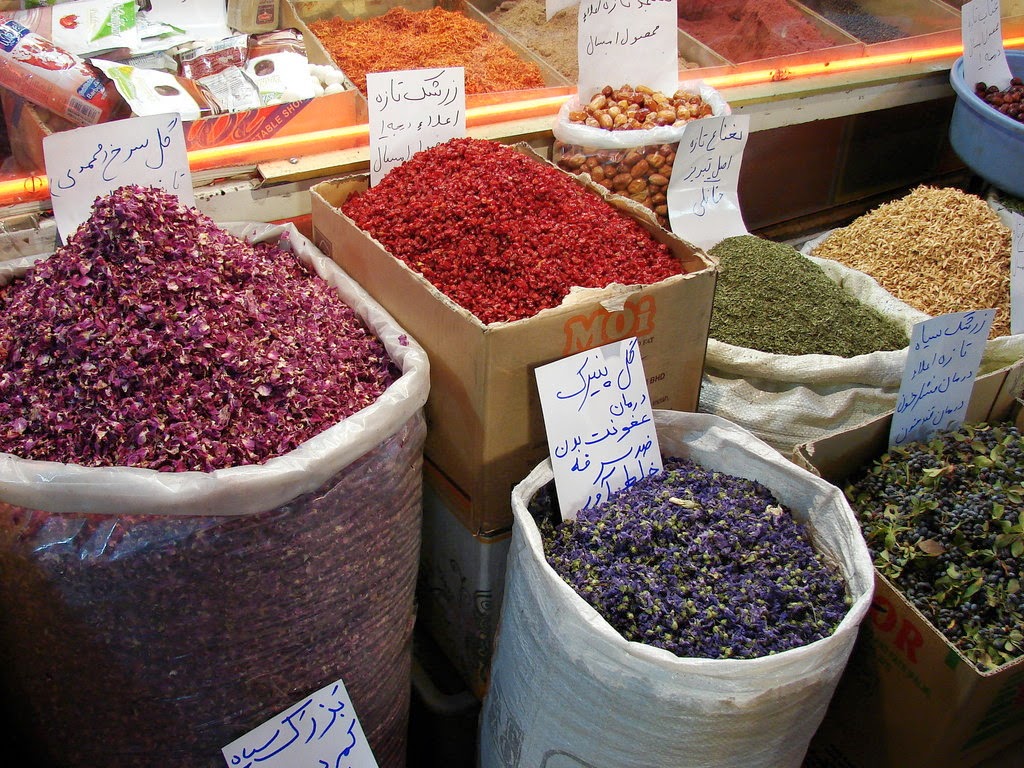 |
| The colours and the smells... |
 |
| Tabrizian jewelers and gold traders. The Tabrizians are known as very astute businessmen |
 |
| A traditional dish from this region - Abghusht. There is a very particular process for eating it which is lots of fun. First, you pour the liquid from the "stew" into a separate bowl. Then you rip up pieces of bread, soak it in the liquid and eat it. |
 |
| Then you take a special masher that you're given, and mash up the remaining parts of the stew - lamb, chickpeas, potato and tomato. The mashed up stew is then eaten with remaining pieces of bread |
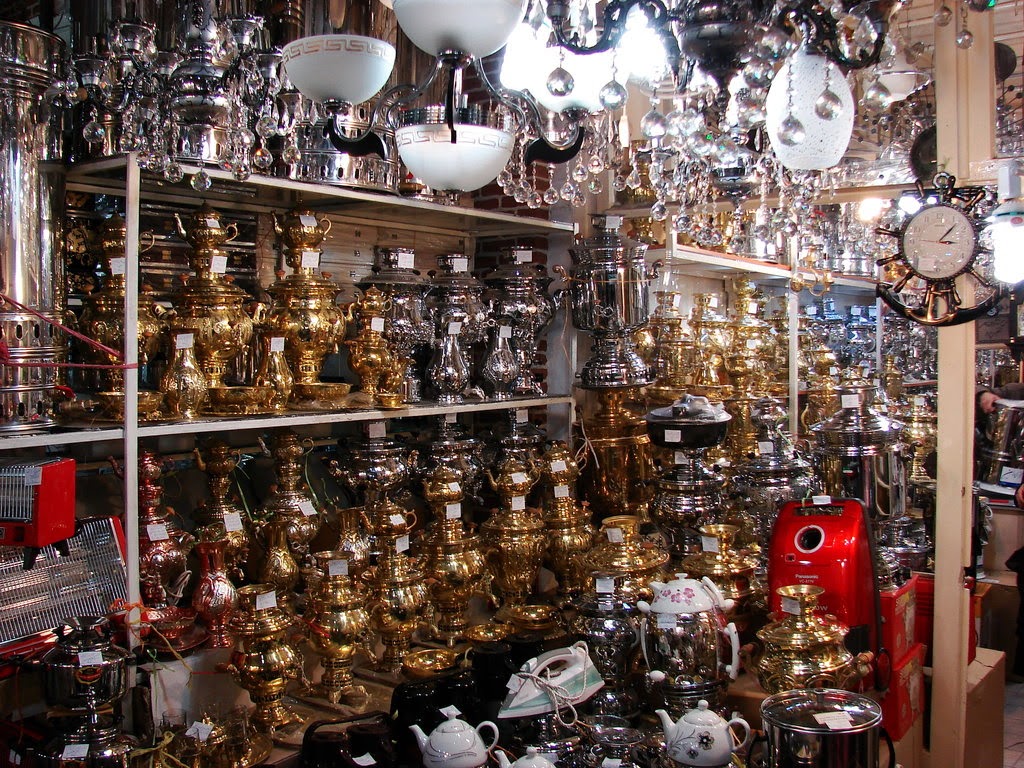 |
| A shop in the bazar selling Persian samovars. These are used to make Persian tea in the traditional way. The tea made by them is delicious! |
 |
| Carpet shop in the bazar. The decorative carpets were really intricate and almost looked like paintings, having incredibly rich colours and fine detail. |
 |
| An Iranian soup, Ash, made by one of our hosts. It tasted as good as it looked! |
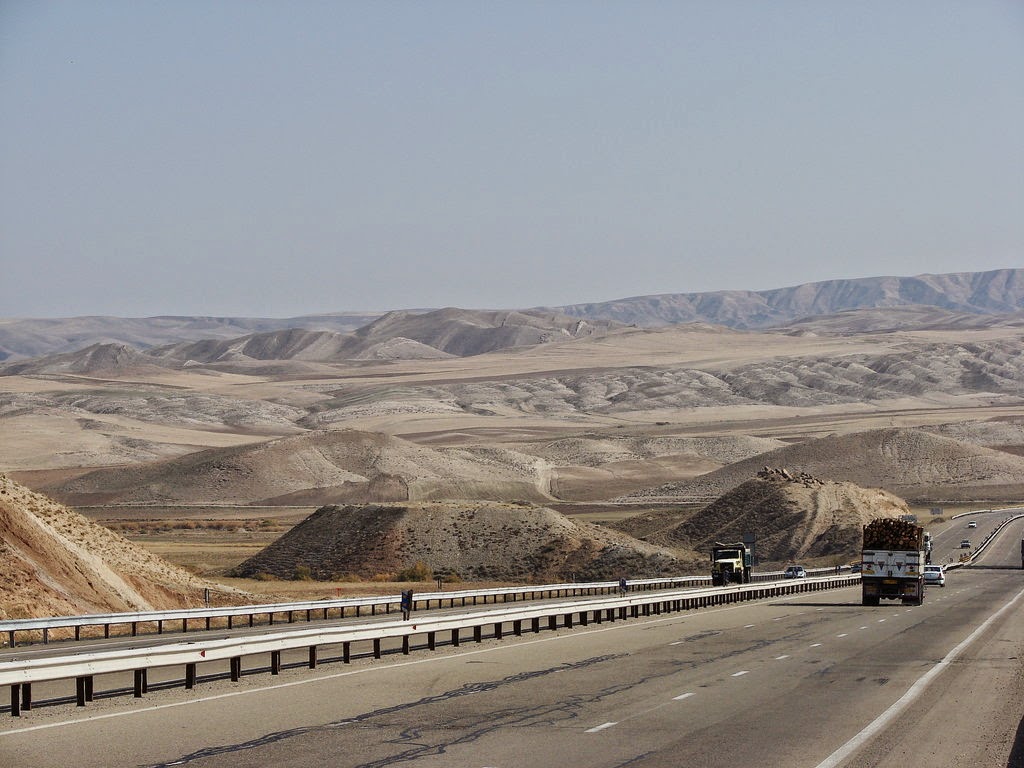 |
| On the road towards Tehran. Much of the landscape is quite dry. I was expecting it to be a bit more green in these parts, but I learned that they have had quite a bad drought this year. |
 |
| Traditional village with still some mud-brick houses beside the highway |
 |
| Camels! |


















No comments:
Post a Comment